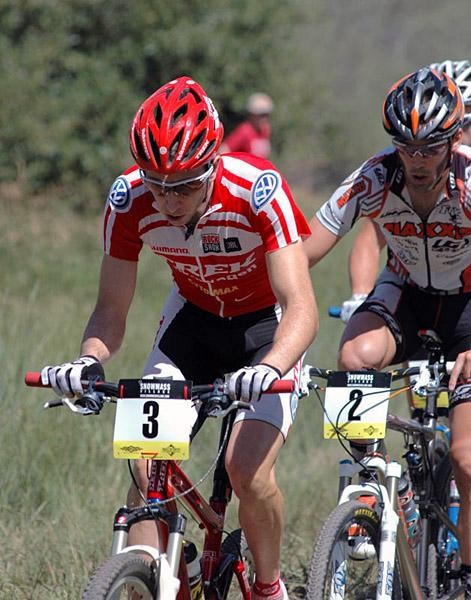Tidewater Challenge sees 20 years of mountain bike trends come and go
By Sue George The Tidewater Challenge, held near Williamsburg, Virginia, celebrated its 20th annual...

By Sue George
The Tidewater Challenge, held near Williamsburg, Virginia, celebrated its 20th annual running last weekend. During that time Race director Steve Nevins, who's run the event for every edition, has seen the trends come and go in cross country mountain bike racing.
The race's attendance topped out at 375 attendees over a decade ago. "That year I still had a first timer class. There were over 100 first timers and over 100 beginners. That was back in 1994 when mountain biking, in my opinion, peaked. It was when the mountain bike was being used at the hot tool in marketing," said Nevins who reflected back to a pre-X-games time when cross country mountain biking was still perceived as extreme and appeared in many TV commercials to advertise non-cycling products.
"Now it's kind of switched," Nevins said. "The hard core people who were in it from the beginning – they're now in the vet and master classes or doing the enduro. My beginner classes are small which is not really good for the sport. It's a little bit like a stock; you can watch the participants to judge the sports' future."
Nevins is doing his part to grow participation. "I went back to making the kids class a free class." He also pointed to a program in motorcross that could serve as a model to get kids into the sport in the future. "If you look at motorcross, there are huge kids' classes. You even have to have a certain GPA in school to qualify to participate. One motorcycle manufacturer provides the bikes for a day and kids have to apply." It's a privilege for the young racers to compete and their expenses are reduced with the help of manufacturers.
Nevins isn't sure why there aren't more youth racers. "The TV coverage died off," he offered as one possible explanation. "When mountain biking started, it was looked at as an extreme sport. It was before X-games, but it had that kind of feel. Now you've got guys on motorcyles and bikes doing back flips and downhills. It's like [cross country] mountain biking is kind of confused about what it is. It's not road racing, it's not like the Tour de France. It's not like downhill guys dropping off eight foot ledges or doing backflips. It doesn't seem to be marketed well." Last but not least, Nevins pointed out that the US is not particularly bike-friendly, which only discourages new participants.
Around the time Nevins started promoting his race in the late 1980s, there were just two other men in Virginia putting on mountain bike races: Eric Cohen and Kyle Inman. It was an era before there were designated mountain bike trails and riders just went where they could, often on trails poorly designed for bicycle use.
The latest race content, interviews, features, reviews and expert buying guides, direct to your inbox!
"That first day when the race happened, I was walking through to make sure the ribbons were up on the road part of the course, and I could hear people riding and talking on a pre-ride and they were talking about how cool it was. This was back in 1989 before there were designated trails for mountain biking – we just rode hiking trails. This was something specific for mountain biking. I took what Eric started and put it through the roof. I'm a course guy. I like setting stuff up and making people ride fun stuff."
The race has been held at three venues including the Newport News' Mariner's Museum Park for the first two years. The park decided instead to focus on hiking and walking trails and so Nevins "moved to another venue for one year, which was the same as used by the Peninsula 100 motorcycle harescramble course." Starting with the fourth annual event, the race moved to its current location – thanks in part due to Nevins' motorcross background and connections.
Even after 20 years, there are improvements to be made. Nevins is always tweaking the course, which is on private land and not open for riding other than for the race. "This year was the best course ever. It's about four miles. It still has whoop de doos and tight and twisty and I try to make it flow really well. I change it over the year. It flows really good if you stay on the course. It flows badly if you get off the course. So it's not the most beginner friendly course ever - riders may struggle if they're not as good with shifting and steering."
This year's race attracted 275 racers and marked the end of the season of mountain bike racing in Virginia. Nevins is already looking forward, with plans to streamline the logistics of the race and focus on the riding and the course. "I want to keep it going. I may just try to outlast everybody (laughing). I just want to simplify it a little bit. I'm leery to use the word down-size. I think I'll cut out some stuff."
He plans to reduce perks like flyers, pint glasses and water bottles to reduce logistics. "That stuff hurts my race day stuff because my brain is fried and the questions of racers don't resonate."
The men's race on Sunday was won by Jeremiah Bishop ahead of Todd Helmick and Jeff Schalk. Sue Haywood won the women's race ahead of Cheryl Sorenson and Carolyn Popovich. All six racers ride for Trek/VW, a team that consistently shows its support for the annual event.
